#Dyspepsia Treatment
Text
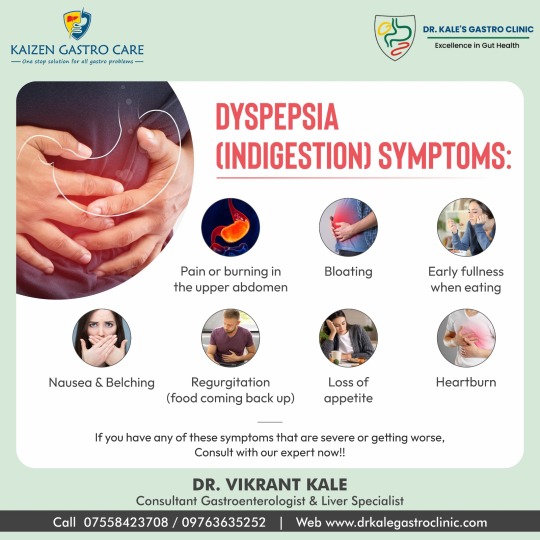
Experiencing Dyspepsia (Indigestion) Symptoms? 🔥🤢 Get relief from pain, bloating, and more with expert guidance! Consult with us today and regain your comfort.
0 notes
Text
youtube
Understanding Dyspepsia: Watch our informative video to learn about the causes, symptoms, and effective management of dyspepsia, commonly known as indigestion. Discover practical tips for finding relief and promoting better digestive health.
#indigestion specialist in coimbatore#functional dyspepsia treatment in coimbatore#Dyspepsia Treatment in coimbatore#Youtube
1 note
·
View note
Text
From Grocer’s Itch To Milk Leg: Here Are 17 Antique Diseases That Once Tormented Cincinnatians
If you practiced medicine in Cincinnati during the 1800s, you encountered some nasty and mostly fatal germs like typhus, diphtheria, smallpox, and dysentery. In the age before antibiotics, your therapeutic options might involve anything from leeches to opium to a big dose of hope. Cincinnatians endured many diseases we don’t hear about anymore. Here are a few of them.
Black Water Fever
For a good portion of its first century, Cincinnati saw regular infestations of malaria, usually identified then as “bilious fever.” In extreme cases, malaria transformed into the usually fatal Black Water Fever, characterized by extremely dark urine caused by red blood cells bursting and releasing a flood of hemoglobin. It was just as nasty as it sounds.
Bronze John
Cincinnati was largely built on commercial relations with the American South and consequently we adopted a lot of Southern terms. One was “Bronze John” as a name for Yellow Fever. That term seems to have originated in Memphis. Cincinnati newspapers watched Memphis intently. If “Bronze John” appeared in Memphis, it was almost certain that Yellow Fever would erupt in Cincinnati.

Catarrh
A multitude of ailments, from the common cold to asthma and hay fever were lumped together under the name Catarrh. Almost any condition that involved a stuffy nose or chest congestion got diagnosed as such. Amazingly, the most commonly prescribed treatments for Catarrh involved smoking aromatic herbs or grinding such spicy plants into powder and inhaling them as snuff.
Chin Cough
Today, we call it whooping cough or pertussis. We vaccinate children so they don’t get it. Back in the day, it was sometimes called “Chin Cough” and was among the maladies certain to be banished with a dose of the patent medicines promoted by fly-by-night hucksters passing through town. An 1822 editorial in the Cincinnati Gazette so enthusiastically supported universal cowpox vaccination that the writer claimed it not only prevented smallpox but “effectively cured scrofulous swellings [inflamed lymph nodes], ophthalmia [conjunctivitis] and chin-cough.”
Collywobbles
Although this is the name of a real disease, namely a nervous or upset stomach, hardly anyone ever used the word in a serious situation. Adults suffered from dyspepsia. Greedy little kids who ate too much candy got the collywobbles. The term was also used humorously in political commentary to satirize politicians who feigned distress on learning about the machinations of their opponents.
Cooties
It was a schoolyard taunt for those of a certain generation: “Stay away from girls because they’ve got Cooties.” Or it was a game – still manufactured by Hasbro. Long ago, Cooties were no laughing matter; it was a nickname for lice. Although lice infestations were not rare in Cincinnati, “Cooties” usually referred to lice endured by soldiers in various wars, especially World War I.
Dandy Fever
Today, we think of Dengue Fever as a tropical inconvenience, but it was once fairly common in Cincinnati, generating a number of nicknames including “Bucket Fever,” “Broken Bone Fever” and “Dandy Fever.” The tendency of this mosquito-borne disease to cause severe joint pain led sufferers to adopt a very stiff-jointed mode of walking in which they appeared to imitate the gait of a dandy.
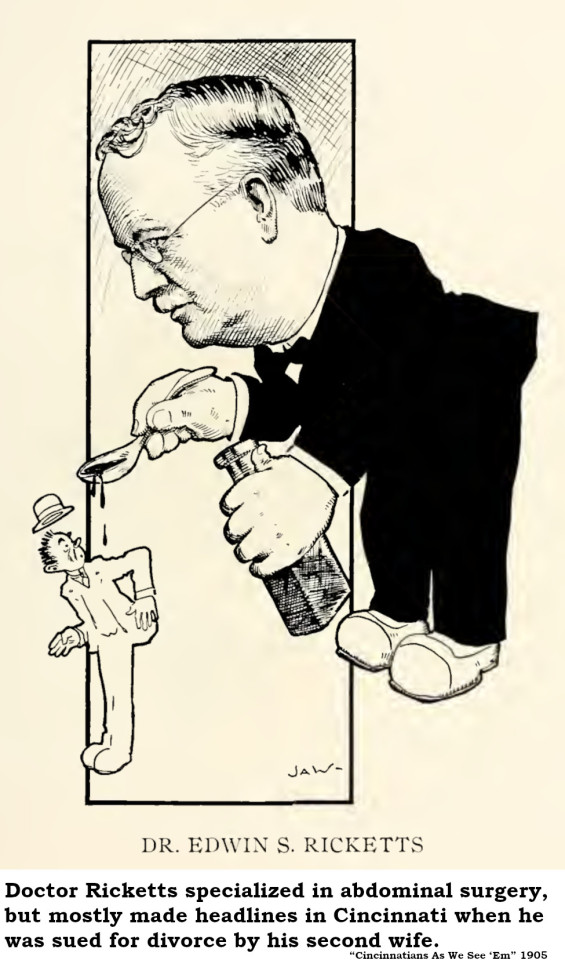
Dry Bellyache
Sometimes known as “Painter’s Colic,” the disease called Dry Bellyache is essentially lead poisoning. It is one of the symptoms of exposure to heavy metals such as lead. Some of the first described cases were traced to consumption of cheap rum, which accumulated a hefty dose of lead from the solder holding distillation coils together.
Grippe
Usually referred to as “The Grippe” or “La Grippe,” influenza was a dangerous infection then and now. The term comes from the French word for influenza, hence the “La.” In an attempt to Anglicize the French term, some newspapers used “The Grip.” Death resulted so often from The Grippe that newspapers alerted travelers to avoid cities in which it was rampant. The Cincinnati Gazette of 18 April 1837 carried the news, for example, that The Grippe was raging in Constantinople.
Grocer’s Itch
In the days before packaged goods, grocers sold a lot of bulk staples such as flour, lard and sugar. An occupational condition known as Grocer’s Itch was common among Cincinnati’s shopkeepers and was caused by a type of mite, Acarus sacchari, known as the “sugar insect” although it was not an insect; mites have eight legs. Anyone devoting any amount of time to measuring raw sugar was likely to see their arms and hands infested with mite bites.
Jail Fever
When sanitary conditions in Cincinnati’s finest homes were iffy at best, the city’s prisons were positively deplorable. Among other diseases, typhus was endemic and so common among prisoners that it gained the nickname “Jail Fever.” The Cincinnati Gazette [25 January 1876] emphasized just how serious the situation was: “A case was mentioned of a jail prisoner who was brought into court to receive his sentence while suffering with typhus fever, and within one week every member of the Court, judge, jurors, Sheriffs and all were dead.”
Milk Leg
The Cincinnati Semi-Weekly Gazette of 14 October 1873 carried a letter promising quick relief from Milk Leg. The remedy, involving chamber lye and boiled mullein leaves, appears to be more trouble than it was worth, but the correspondent claimed it cured her after she “had lain from in December till the next corn planting.” Today, we would call Milk Leg phlebitis, a condition in which the veins of the leg become inflamed.
Salt Rheum
If you were afflicted by Salt Rheum in 1853, an advertisement in the Cincinnati Enquirer offered sure relief: “Salt Rheum, (or Tetter), Scald Head and Ring Worms positively cured in every ninety-seven cases in a hundred, by the use of Gridley’s Salt Rheum Ointment, which is justly ranked by the most learned physicians as one of the most important discoveries of the nineteenth century.” Salt Rheum, Tetter and Scald Head were all various forms of skin disease including eczema, psoriasis, and some forms of herpes. Another dermatological affliction, involving small whitish patches of itchy skin caused by cold weather was known as Chilblains.
Scorbutic Fever
Almost unheard of today, except among adherents of extreme diets, scurvy is a debilitating disease caused by a shortage of Vitamin C. In extreme cases, scurvy could produce elevated body temperatures variously known as Scorbutic Fever or “Camp Fever.” The “camp” in question was not a vacation getaway but a prison camp and reflected the abysmal food provided to the inmates.
Scrivener’s Palsy
There are not many scriveners employed these days, so think of poor Bob Cratchit in Charles Dickens’ “A Christmas Carol.” Hunched over a poorly lit desk, scribbling away all day was bound to have an effect, and so it did, in an affliction that we might call “Writer’s Cramp” today, if there were any writers who still used a pencil and paper. The Cincinnati Gazette of 8 July 1875 reported the emergence of a similar affliction, “Telegrapher’s Palsy.” Also caused by clerical work was “Typewriter’s Disease,” but this was a mental condition in which over-concentration on transcribing verbiage led to a sort of psychosomatic blindness in which the victim was unable to read at all.
Scrumpox
The malady known as Scrumpox is still around today but, since its cause is now known, it goes by a different name – Herpes Gladiatorum. As the older name implies, it is a skin condition, a form of herpes, passed along by athletes rubbing exposed skin together, as in a rugby scrum. In fact, the first attempt at a scientific name for the disease was Herpes Rugbiorum. It also shows up as “Wrestler’s Herpes.” The Enquirer of 12 April 1896 listed scrumpox among some other athletic disorders including “Golf Arm” and “Cyclist’s Back.”
Sinking Chills
The Cincinnati Gazette of 30 April 1874 reported: “Andrew Palmer, a pioneer citizen of Butler Township, died yesterday, of sinking chills, aged 70 years.” Mr. Palmer may have been the victim of any number of pernicious or intermittent fevers, the most common of which were a symptom of malaria. Sinking Chills also described a sort of general malaise targeted by a lot of the spring tonics and nostrums concocted by the patent medicine industry. Another antique term for malarial fevers was Ague, usually called The Ague.
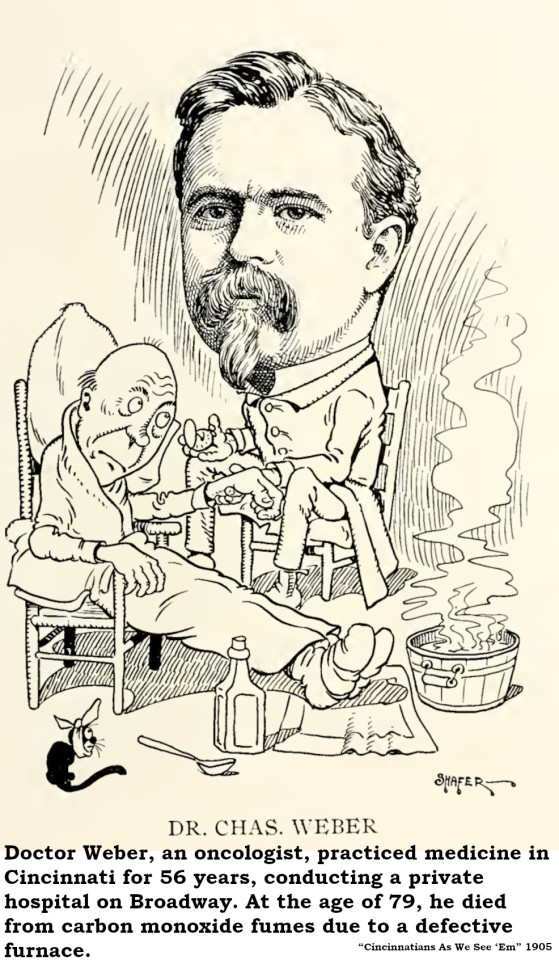
10 notes
·
View notes
Text
Unveiling The Gastric Problems: Common Symptoms And Their Causes
Gastric problems, ranging from mild discomfort to severe pain, can significantly impact daily life. Understanding the symptoms and their underlying causes is crucial for effective management and treatment. In this article, we'll explore seven common symptoms of gastric problems and delve into their potential causes, providing valuable insights for better health and well-being.
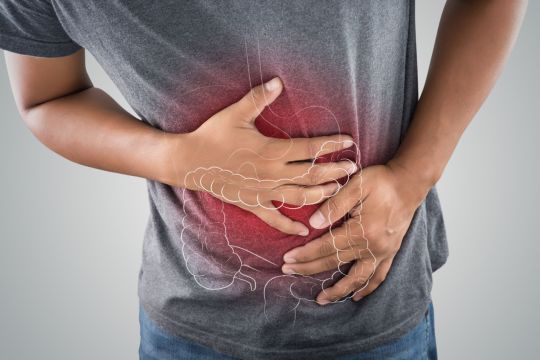
Abdominal Pain: Abdominal pain is a hallmark symptom of various gastric issues, including gastritis, ulcers, and gastroesophageal reflux disease (GERD). The pain may vary in intensity and location, ranging from a dull ache to sharp, stabbing sensations. Gastric ulcers, caused by the erosion of the stomach lining, often result in a burning pain in the upper abdomen. GERD, characterized by the reflux of stomach acid into the esophagus, can cause a burning sensation in the chest, known as heartburn.
Bloating and Gas: Excessive gas and bloating are common complaints associated with gastric problems. Gas can accumulate in the digestive tract due to factors such as swallowing air, bacterial fermentation of undigested food, or impaired digestion. Bloating, characterized by a feeling of fullness or tightness in the abdomen, often accompanies excessive gas production. Conditions like irritable bowel syndrome (IBS) and small intestinal bacterial overgrowth (SIBO) are frequently implicated in chronic bloating and gas.
Nausea and Vomiting: Nausea and vomiting are symptoms that can occur in various gastric disorders, including gastritis, gastroparesis, and peptic ulcers. Gastritis, inflammation of the stomach lining, can trigger nausea and vomiting, particularly after meals or when the stomach is empty. Gastroparesis, a condition characterized by delayed stomach emptying, may lead to persistent nausea and vomiting, especially after consuming solid foods. Peptic ulcers, open sores in the stomach or duodenum, can cause nausea and vomiting if they irritate the stomach lining.
Indigestion (Dyspepsia): Indigestion, also known as dyspepsia, encompasses a range of symptoms, including discomfort or pain in the upper abdomen, bloating, and a feeling of fullness during or after meals. It can occur as a result of various factors, such as overeating, eating too quickly, or consuming spicy or fatty foods. Gastric disorders like GERD, gastritis, and peptic ulcers can also manifest as indigestion. Persistent or recurrent indigestion warrants medical evaluation to identify and address the underlying cause.
Acid Reflux: Acid reflux occurs when stomach acid flows back into the esophagus, causing a burning sensation in the chest (heartburn) and a sour taste in the mouth. It is a common symptom of GERD, a chronic condition characterized by frequent episodes of acid reflux. Certain dietary and lifestyle factors, such as consuming acidic or fatty foods, smoking, and obesity, can exacerbate acid reflux. In some cases, structural abnormalities like a hiatal hernia may contribute to the development of GERD.
Loss of Appetite: A decreased appetite, or anorexia, can be a symptom of various gastric disorders, including gastritis, peptic ulcers, and inflammatory bowel disease (IBD). Gastritis, characterized by inflammation of the stomach lining, can lead to a loss of appetite due to discomfort or nausea associated with eating. Peptic ulcers, particularly those located in the stomach, can cause a feeling of early satiety or discomfort after meals, leading to reduced food intake. Inflammatory bowel disease, which includes Crohn's disease and ulcerative colitis, can affect the entire digestive tract and cause appetite loss.
Changes in Bowel Habits: Changes in bowel habits, such as diarrhea, constipation, or alternating episodes of both, can indicate underlying gastric issues. Conditions like IBS, characterized by abdominal pain and altered bowel habits without any detectable structural abnormalities, often present with diarrhea, constipation, or a combination of both. Inflammatory conditions like Crohn's disease and ulcerative colitis can cause diarrhea, often accompanied by abdominal pain, rectal bleeding, and weight loss. Constipation may occur due to factors such as inadequate fiber intake, dehydration, or certain medications.
Gastric problems can manifest in various ways, ranging from abdominal pain and bloating to acid reflux and changes in bowel habits. Identifying the symptoms and understanding their underlying causes are essential steps in managing gastric disorders effectively. If you experience persistent or severe symptoms, it is important to seek medical advice for proper evaluation and treatment. With the right approach, many gastric issues can be effectively managed, allowing for improved quality of life and overall well-being.
3 notes
·
View notes
Text
to the person who said i post ana content:
I am 90 lb because I have a deadly, dangerous, progressive, treatment and cureless disease called Chronic Pancreatitis Stage 2. I'm a nondiabetic hypoglucagonemic and have severe biliary dyskinesia and dyspepsia. My bilirubin, liver enzymes and trypsin are chronically high. This means I often live off an IV and may soon need an NG. I never drank, smoke or partied, my condition is considered unknown cause.
That is why I eat low fat, and weigh little. It is not because I find weighing little to be attractive or low fat recipes to be particularly endearing. I would very much like to take a pill that cures my pancreatitis and smash impossiwhoppers back to back, but there is no treatments or cures.
I hope that helps explain my behavior and relationship with food, to whomever was wondering.
5 notes
·
View notes
Note
So glad to hear that you finally have answers! I'm sure it's gonna make everything at least a bit easier to deal with! I hope that whichever plan of action your doctors now decide to take works quickly and without any problems for you. Beautiful souls like yours don't deserve to be in agony 😓😣
And don't you even dare feel guilty for not coming on Tumblr much now. Your health, physical and mental, is the most important thing!!!
(Me? I've been... existing 😅)
(also, I didn't realise we were mutuals until like a minute ago lol)
first of all, so sorry for the late response! and even if you are just existing, i hope that this existence is treating you gently and lovingly 💗 (and yeah! we're moots now yay!! <3)
but yeah, a definitive answer is really nice. a few days ago they actually sent in a letter saying: "visceral hypersensitivity/overactive nerves sending inappropriate signals to the brain. There is actually no acid reflux." he said it's best treated with low dosages of antidepressants. he also recommended me to get testing done for gastroparesis, and if that comes back "unremarkable", we'll focus treatments on functional dyspepsia.
i have noticed lately that i have had really bad brain fog, esp since this has all started. i've been having a really hard time concentrating, almost constantly fatigued, zone out a fuck ton more than i usually do, and am asking people to repeat themselves quite literally every time they speak, because it all sounds like absolute gibberish. also, (tmi warning), in the past 4 months, i have only had one (1) period that lasted one (1) day. one day. it wasn't even a heavy flow either. my last regular period was when the day this whole situation started, in late november. and i'm currently exactly 3 weeks late for one. like i get the cramps and everything that you get with a period, except the blood.
so... i think this whole brain and nerve thing is going a LOT deeper than just my dyspepsia like systems. i haven't brought any of this up to my doctor, but the next time i see her, i'm gonna. but i have no damn clue what i'm gonna do at this point tbh. (personal/family rant incoming)
my dad is one of those extremely die-hard conservative trumpers, and a MASSIVE conspiracy theorist (just search up qanon; it'll explain everything i'm about to tell you). he was extremely against me getting the endoscopy, saying that my mom and i didn't mention me getting anesthesia (i did mention multiple times throughout the week before I got it done bc he was so damn worried), and him and my mom fought the morning I got the endoscopy done, just before we left.
when we got back, it was absolute hell for about a week, for my mom and i both. he told me that we betrayed him and that someone 'gave me permission' to not follow his instruction (I am 18 when he tells me this btw). then he said that if my mom and i ever question his rules or instruction again, he'll leave us or, worse, [a threat that i don't feel comfortable sharing here] for a week, he accused me of working for my mom's past sexual abuser, and of things i also don't feel comfortable sharing here. and then a week later, everything is perfectly fine. just like that. i'm used to extremely sudden mood and emotion changes in this family; i've been dealing with it for about a decade now (verbal abuse followed by lots of affection through words and gifts over and over). but this isn't my problem at the moment.
throughout the week, i also told him that i considered surgery for my gerd. he then proceeded to tell me that if i even considered doing that, or whatever the doctors say, i'm a retard, and that i clearly don't need him anymore (bc im not following his instruction) and he'll just leave us. and that we don't need him, we just have to "say the words" and he'll be out. so.
when we got this letter, he kept on saying how dumb and uneducated my doctors are (my dad's a high school drop out btw). i don't exactly remember what he said, but it was something to the effect of me needing to drink more water and eat healthier food, but I told him that's what we started with when i found out I had gerd and IBS 5 years ago, and it did nothing. he stood there, silent, for a solid 10 seconds before saying "......you know antidepressants can change your change you and fuck you up forever, right?". and at that point i just kind of gave up.
also my mom was attempting to explain the letter to my dad in the car ride home from picking her up from work, but she said he kept yelling and interrupting her, and just not listening to any explanationa she had to give; i wasn't there for that part.
but in conclusion: i know i'm 18 and can make my own decisions. i know he can't legally stop me from anything now. but for some stupid, insanely stupid reason, i just subconsciously hold my dad's validation more important than my lifelong health.
i even told my mom about all of this, that i'm stuck between my dad's acceptance and my lifelong health, but i also can't seem to say anything either way that will make him happy. And she just said "we'll you're fucked (with making my dad happy), either way, right? why don't you pick the one that comes with you being healthy?" and that actually straightened it out a bit for me.
but like. i still feel IMMENSE guilt whenever i do something that displeases or angers him even in the slightest. i don't know why im hanging my entire self worth one person, him, and i know just how fucked up it is. but it's like i can't stop. i just... i don't know. the situation just seems to be 'do i take care of myself, and him be angered towards me/leave me, or do i neglect my better judgement for the acceptance of my father?'
so that's what i'm currently dealing with at the moment lmfao. thank you so, so much for the ask, and i'm sorry the response was a college final essay. i sincerely hope with all my heart that today/tonight treats you well. 💞
#mine#personal#asks 💌#girl that writes#did i mention that my dad's side the family has a deeply embedded history of paranoia#and multiple different mental illnesses and personality disorders lol
3 notes
·
View notes
Text
Helicobacter Pylori
Spicing things up a bit with a Gram Negative Helical/spiral Bacteria

Epidemio:
up to 50% of the population worldwide, but even more in endemic countries/the 3rd world

it can cloud differentials, as it can be asymptomatic unless it caues peptic ulcer disease, in which case the infection may have been decades prior to detection - so you have to interpret serology with a grain of salt (it may not be the culprit of acute infection)
often picked up in early childhood and lingers without treatment for dcades
by contrast, 5% of children in the US have had it, so it may change your clinical decision making depending on where your patient grew up
In australian populations, up to 30% have it, but again, high frequency in older migrants, lower socioeconomic status etc.
Transmission:
faecal oral or even sexual (did not know that one)
increased risk:
lower socioeconomic status/growing up in a developed country
family history of infection and gastric cancer
What it does:
cause ulceration (peptic ulcer disease)
and inflammation or gastritis
due to it's helical shape and flagella, it can penetrate the mucosal lining
Trivia/History:
discovered by Australians in Western Australia in the 1980s
To quote the IM physician, Barry Marshall, in the face of skepticism that a bacteria could survive the stomach's acidic environment: "everyone was against me, but I knew I was right"
After failing to publish and some lab snaffus, he decided to do a Jonas Salk and swallow a broth of Hpylori himself. Of course this last experiment was published in an Australian journal.
At any rate, it is now widely accepted that Hpylori is linked to PUD and gastric cancer and by 2005, the two Australians who found the bacteria received the Nobel prize in medicine
we now know so much more about the pathogen with advancements in microbiology
they also came up with the urease breath test for it
Clinical presentation:
asymptoamtic
symptom onset occurs after gastritis and peptic ulcer disease develop: nausea, vomiting, dyspepsia, abdo pain, or at the extreme when the lining has eroded, bleeding/haematemesis
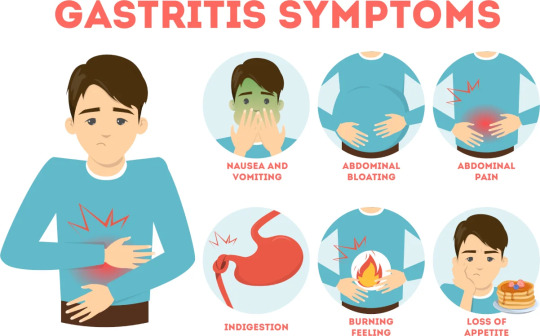
IMage source
Important differentials
coeliac's
Crohn's
nSAID induced gastritis
reflux
lactose intolerance
eosinophilic oesophagitis (sooo rare, usually a/w dysphagia)
Investigations
(all with relatively good/high sens and spec)
H pylori antigens in stool
serology (antibodies in serum, urine) --> usually IgG, hence can remain positive for years even post eradication
urease breath test
if a scope was involved due to PUD, then histopathology and culture (reduced sensitivity if treated with PPI in 2/52 prior or Abx 4/52 prior)
actually had no idea they breathed into little bags.

Treatment:
triple therapy - PPI, amoxicillin and clarithromycin for 14 days, in penicillin allergy replace amox with metro (increasing resistance is why metro is not first line in some countries - refer to local guidelines made based on local Abx resistance trends)
In patients younger than 50, it can be cost effective to treat if they have reflux on testing (if there's a high pretest probability - see increased risk groups) given the life time risk of PUD & gastric cancer, can also reduce risk of GIB
balance of risk/benefit: will it significantly improve QOL or will risks of ADRs outweigh the benefits (eg frail, elderly, multiple comorbidities)
when used in those with PUD - improves ulcer healing, recovery and prevents relapse
in simple ulcers, triple therapy is all that is required in more chronic complex ones --> 8/52 of PPI is also recommended to prevent recurring of bleeding etc.
not treating can lead to relapse and complications like bleeding/perforation/cancer risk
Complications
rarely, it can cause gastric adenocarcinoma as a known carcinogen
aka MALT lymphoma - mucosa-associated lymphoid tissue
this resolves with triple therapy (Usually)
consider it in family histories of gastric cancer
life time risk of gastric cancer at 2% and 15-20% risk of peptic ulcer disease
Wish the acronym wasn't MALT. But could be a good way to remember it. MALT, tasty, gastritis and Hpylori.

Follow-up
test for eradication 2 weeks post with stool antigen or urease breath test (serology less effective as the IgGs can remain positive for years) but that's on holding the PPI for 1/52 to prevent a false negative, some countries want both tests
in resistance or relapse there's salvage therapy, usually with bismuth or a quinolone.
Sources:
Wikipaedia - I havent covered pathophysio or it's cellular mechanisms and virulence factors, but there's a good overview in wiki
StatPearls (more paeds focused in this one)
CDC guidelines
Australian Therapeutic guidelines (Paywalll rest above are free)
5 notes
·
View notes
Text
Ayurveda , Doctor , Treatment , Nadi Pariksha , Medicine , Pure Herbs , Sri Sri Tattva , The Art of Living ,Sudarshan Kriya , Yoga , Meditation

Sri Sri Tattva Nadi Pariksha
youtube
“Ayurveda” is being recognized as a holistic system of medicine, Which holds that the body is the foundation of all Wisdom and Source of all Supreme Objectives of life.Ayurveda” have effective treatment for, Asthma, Mental Tension , Spinal Disorders , High blood pressure ,
Mental Stress, Spondylosis , High Cholesterol , Fatigue , Obesity , Headaches , Respiratory Problems , Heart Diseases , Migraine , Gastric Complaints , Chest Pain , Arthritis , Weight Loss , Osteoarthritis , Body Purification , Gynecological Disorders , Rheumatism , Anti-ageing , Chronic Constipation , Speech Disorders , Piles , Back Pain , Nervous Disorders , Hair Loss , Gout , Premature Graying , Skin Diseases , Psoriasis , Insomnia , Memory Loss , Pain , Gastric Problems , Immunity Problems , Anemia , Acne , Anorexia , Anxiety , Acidity , Bronchitis, Diabetes , Dyspepsia , Dysentery , Dandruff , Depression , Diarrhea , Dengue , Chikungunya , Indigestion , Urinary bladder disorder , Fungal infection , Nasal Congestion , Gum and Tooth diseases , Vitiation of blood , Burning Sensation , Oedema , Emaciation , Impotency , Inflammation , Ulcer , Thirst , Chloasma of face , Tastelessness , Pleurodria , Intercostal neuralgia , Pthisis , Vitiation of semen , Sciatica , Filariasis , Tumour , Intermittent fever , Lassitude , Hoarseness of voice , Mole , Conjunctivitis , Glaucoma , Myopia , Repeated Abortion , Duodenal ulcer , Malabsorption syndrome ,
youtube
Eczema , Flatulence , Fever , General Debility , Irregular Menstrual Cycle , Jaundice , Hepatitis , joint Pain , Kidney stone , Leucorrhea , Leukoderma ,
Liver Disorder , Menopause , Premenstrual Tension , Pyorrhea , Peptic Ulcer ,
Palpitation , Rheumatism , Ringworm , Stress Management , Sinusitis , Sore Throat , Skin Allergy , Sciatica , Sleeplessness ,Toothache , weight ,
Urinary Diseases , Vertigo , infection , Restlessness , Hypertension ,
Malarial Fever , Cough , Cold , Pimples , Black Heads , Appetite problem , Vomit , Eye problems , Abdominal fever , Abdominal lump ,
Swelling , Fibroid , Cyst , Bleeding , Infertility in men and women ,
Pneumonia , Curing Dryness , wounds, cuts, & burns .
Consult a certified Doctor for more details on Ayurvedic Treatment.
youtube
Sri Sri Tattva Ayurvedic Proprietary Medicine , Single Herbs and Classical Medicine at Glance to Promote Health and Wellness
NAOQ19
AMLAPITTARI VATI ,
AMRUTADI VATI ,
ANCHOLEAN TABLETS,
ATISARAHARA VATI ,
DEVA VATI ,
IMMUGEN TABLETS,
JANTUGHNA VATI ,
JVARA KEERTI VATI ,
KASAHARA VATI ,
LIV-ON TABLETS,
MAMATVA GRANULES ,
MEHANTAKA VATI ,
NARAYANA KALPA TABLET ,
NAVAHRIDAYA KALPA TABLETS,
OORJA FORTE TABLETS,
OORJA TABLET ,
OSPO-C TABLETS ,
PAVANAHARA VATI ,
PITTA BALANCE GRANULES ,
PRADARASHAMAKA VATI ,
PRANADA GUTIKA ,
PRATISHYAYAHARA VATI ,
PYLMUKTI OINTMENT ,
PYLMUKTI TABLET ,
QUICK HEAL CREAM ,
RAKTASHODHINI VATI ,
RAKTAVARDHINI TABLET ,
RAKTAVARDHINI SYRUP ,
SANDHIMITRA VATI ,
SHIRASHOOLARI VATI ,
SHWASA SHUDDHI VATI ,
TWAQURE OINTMENT ,
VEDANANTAKA BALM ,
VEDANANTAKA LINIMENT ,
VEDANANTAKA VATI ,
VIRECHANA VATI ,
VRIKKA SANJIVANI VATI ,
VITILWEL OINTMENT ,
VITILWEL TABLETS ,
AMLA TABLETS ,
AMRUTH TABLETS ,
ARJUNA TABLETS ,
ASHWAGANDHA TABLETS ,
ASHWAGANDHADI TABLETS ,
BRAHMI TABLETS ,
CHANDRAPRABHA VATI ,
CHITRAKADI GUTIKA TABLETS ,
DHATRI LAUH TABLETS ,
HARITAKI TABLETS ,
KAMADUDHA RASA TABLETS ,
KAPIKACCHU GRANULES ,
LAVANGADI VATI ,
NAVAYASA LAUHA TABLETS ,
NEEM TABLETS ,
NISHAMALAKI TABLETS ,
RASNADI VATI ,
SAPTHAMRUTH LAUHA TABLETS ,
SHATAVARI TABLETS ,
SHILAJIT LAUHA VATI ,
SUDARSHAN VATI ,
TRIPHALA TABLET ,
TULASI TABLET ,
VYAGHRYADI TABLET ,
YASHTIMADHU TABLET ,
GOKSHURADI GUGGULU ,
KANCHANARA GUGGULU ,
MAHAYOGRAJ GUGGULU ,
TRAYODASHANGA GUGGULU ,
AVIPATTIKARA CHURNA ,
HARIDRA KHANDA ,
HINGVASTAKA CHURNA ,
PAVANHARA CHURNA ,
SITOPALADI CHURNA ,
TALISADI CHURNA ,
TRIPHALA CHURNA ,
BRAHMA RASAYANA ,
CHITRAKAHARITAKI LEHYA ,
KUSHMANDA RASAYANA ,
NASYA NASAL INHALER ,
SRINETRA STERILE EYE DROPS,
SUDANTA TOOTH DROPS ,
KASAHARI COUGH SYRUP ,
MEDHYA RASAYANA SYRUP ,
PACHANI RASAYANA SYRUP ,
PRADARASHAMAKA SYRUP ,
RAKTASHODHINI ARISHTA ,
SARIVA SYRUP ,
USHIRA SYRUP ,
MAHATRIPHALADYA GHRITA ,
PHALASARPI ,
GOMUTRA ARKA ,
GULMAHARA ARKA ,
ORGANIC AJAMODA ARKA ,
ORGANIC TULASI ARKA,
SANDHIMITRA ARKA,
SHAKTI DROPS,
VRIKKA SANJIVANI ARKA ,
ANU TAILA,
KSHIRABALA TAILA,
NARAYANA TAILA,
PINDA TAILA,
SHISHU TAILA ,
OJASVITA RAGI,
PRADARSHAMAKA VATI,
ALOE VERA JUICE ,
AMLA JUICE,
ALOE VERA TRIPHALA JUICE,
KARELA JAMUN JUICE
KABASURA KUDINEER TABLETS,
KABASURA KUDINEER CHOORNAM ,
TURMERIC PLUS TABLETS ,
GILOY JUICE ,
GILOY TULASI JUICE
AYUSH KWATH TABLETS ,
SUDANTA TABS ,
AYUKANTI LEHYAM ,
OJASVITA GOLDEN LATTICE .
KALAMEGH TABLETS ,
AYUSH - 64 ,
SHANKHPUSHPI TABLETS ,
SUKESHA KALPA TABLETS ,
SUKESHA HAIR VITALISER CREAM ,
Giloy juice
Giloy Tulasi Juice
CHYAWANPRASH ,
ALMOND OIL VEG CAPSULE ,
EVENING PRIMROSE OIL VEG CAPSULE ,
FENUGREEK OIL VEG CAPSULE ,
FLAXSEED OIL VEG CAPSULE ,
GARLIC OIL VEG CAPSULE ,
NIGELLA OIL VEG CAPSULE ,
WHEAT GERM OIL VEG CAPSULE ,
APPLE CIDER VINEGAR JUICE ,
WHEATGRASS JUICE ,
MOORINGA JUICE ,
RAW NONI JUICE ,
Brahmi Vati Suvarnayukta
Bruhat Vata Chintamani Rasa
Mahalaxmivilas Rasa
Shwaskas Chintamani Rasa
Sootashekhar Rasa ( Gold)
Suvarna Vasant Malati
Vasant Kusumakar Rasa
Yogendra Rasa
#Rejuvenate yourself with Ayurveda and Yoga Campaign#Ayurveda#Doctor#Treatment#Nadi Pariksha#Medicine#Pure Herbs#Sudarshan Kriya#Youtube
2 notes
·
View notes
Text
Understanding Gastritis: Causes, Symptoms, And Treatments
Gastritis is a condition that inflames the belly lining (the mucosa), inflicting belly aches, indigestion (dyspepsia), bloating, and nausea. It can be acute or chronic. Medications and dietary modifications can lessen stomach acid and reduce gastritis symptoms.
Why Should You Understand Gastritis?
If left untreated, gastritis can lead to several complications increasing your risk of stomach…
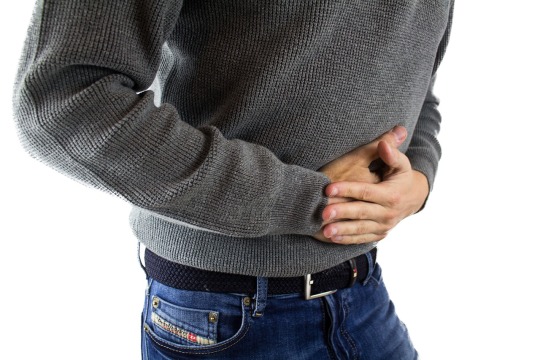
View On WordPress
#And Treatments#Can gastritis cause weight reduction#For how long can gastritis affect you#Gastritis#Gastritis treatment#How Can You Prevent Gastritis#How Is Gastritis Diagnosed#Symptoms#Understanding Gastritis: Causes#What Causes Gastritis#What’s the Difference Between Gastritis and Indigestion#Where is the gastritis ache positioned#Why Should You Understand Gastritis
4 notes
·
View notes
Photo
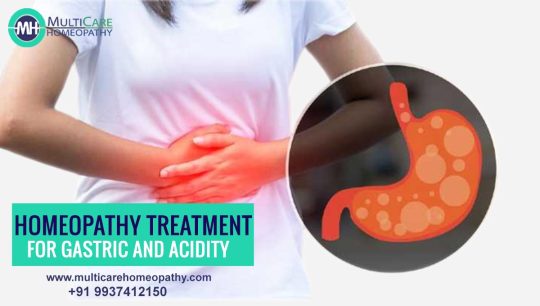
Can Homeopathy Cure Acidity & Gastric?
Acidity is a sign of a digestive problem. Acidity is the result of an excessive buildup of acid inside the stomach's safety valve. Acidity is a digestive problem that everybody suffers in their life. In most of cases, we do not even care about the situation as they go away by drinking plenty of water. Along with that few home remedies and bland food also can benefit in this situation.
Gastric glands that secrete hydrochloric acid, which is essential for food digestion, are found in the human stomach. The disease is known as hyperacidity or acid dyspepsia when the stomach produces an excessive amount of hydrochloric acid.
When food enters the stomach, the acids are released. But certain foods are more challenging to digest than others. The stomach must release more acids in order to process such foods. Such acids could become excessively acidic in the stomach if they are continuously secreted. Indigestion can be treated naturally and quite effectively with homeopathy.
Causes of acidity?
Hyperacidity, by itself, is not a disease. It is actually an effect to certain stressors. Those are -
Prolong use of Non Steroid anti Inflammatory Drugs (NSAID)
Faulty diet habits – regular taking of rich spices hot foods, fast foods, junk foods
Intake of fats, sweets, adulterated and fermented food
Excessive intake of chocolate, tea, coffee
Always Staying in a mental stress and tensed condition
Anxiety and depression
Prolonged insomnia (sleeplessness)
The pressure packed lifestyle
Prolonged alcohol consumption
How can homeopathy help you in acidity?
Homeopathy, on the other hand, works gently to minimize the symptoms of gastric and acidity and treats the root cause of the problem. Homeopathy can be of great help to those who do not show much improvement even after lifestyle modifications. On the other hand, homoeopathy gradually reduces the symptoms while also addressing the underlying source of the issue.
In addition to being quite effective in treating stomach issues, homoeopathic treatments for digestive illnesses also get rid of their underlying causes. Homeopathic remedies for stomach and digestive problems are not only of great help in getting rid of stomach problems but also eliminate the root cause of the digestive disorders.
Many critical cases have been successfully cured by Dr.Satapathy's treatment who is the founder of this world renounced modern homeopathy treatment center. Homeopathy is new age medicines. Homeopathy treatment needs a lot of experiences. We have patients in all over the world.
#homeopathy treatment for acidity#homeopathy medicines for acidity#homeopathy for acidity#homeopathic medicines for acidity#gastric treatment#homeopathy treatment for gastric#gastric issues#acidity treatment
2 notes
·
View notes
Text
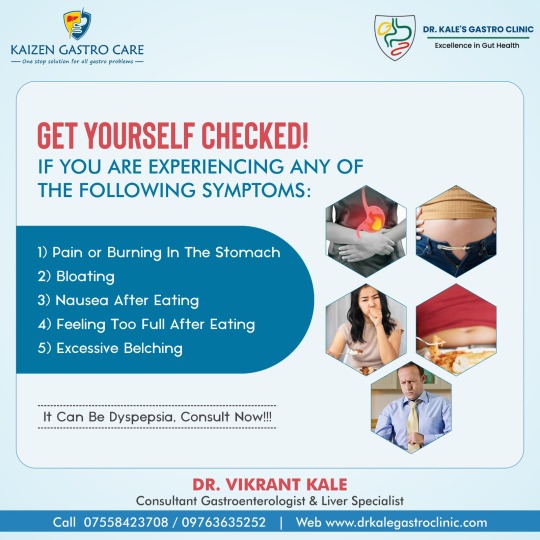
Don't ignore the signs! If you're experiencing symptoms like stomach pain, bloating, nausea after eating, feeling too full, or excessive belching, it could be #dyspepsia. Get yourself checked and consult with Dr. Vikrant Kale to address your concerns and find relief.
Don't suffer in silence, take control of your #DigestiveHealth today!
https://www.drkalegastroclinic.com/
#Dyspepsia Treatment#Dyspepsia Specilaist#Stomach Specialist#Gastroenterologist#Stomach Disease Treatment
0 notes
Text
Indigestion - Causes of Dyspepsia
dyspepsia is a mild condition that can be managed with lifestyle changes such as avoiding trigger foods, eating smaller, more frequent meals, and managing stress. However, if symptoms persist or are severe, Visit Indigestion Specialist in Coimbatore for medication or further evaluation to rule out underlying medical conditions.
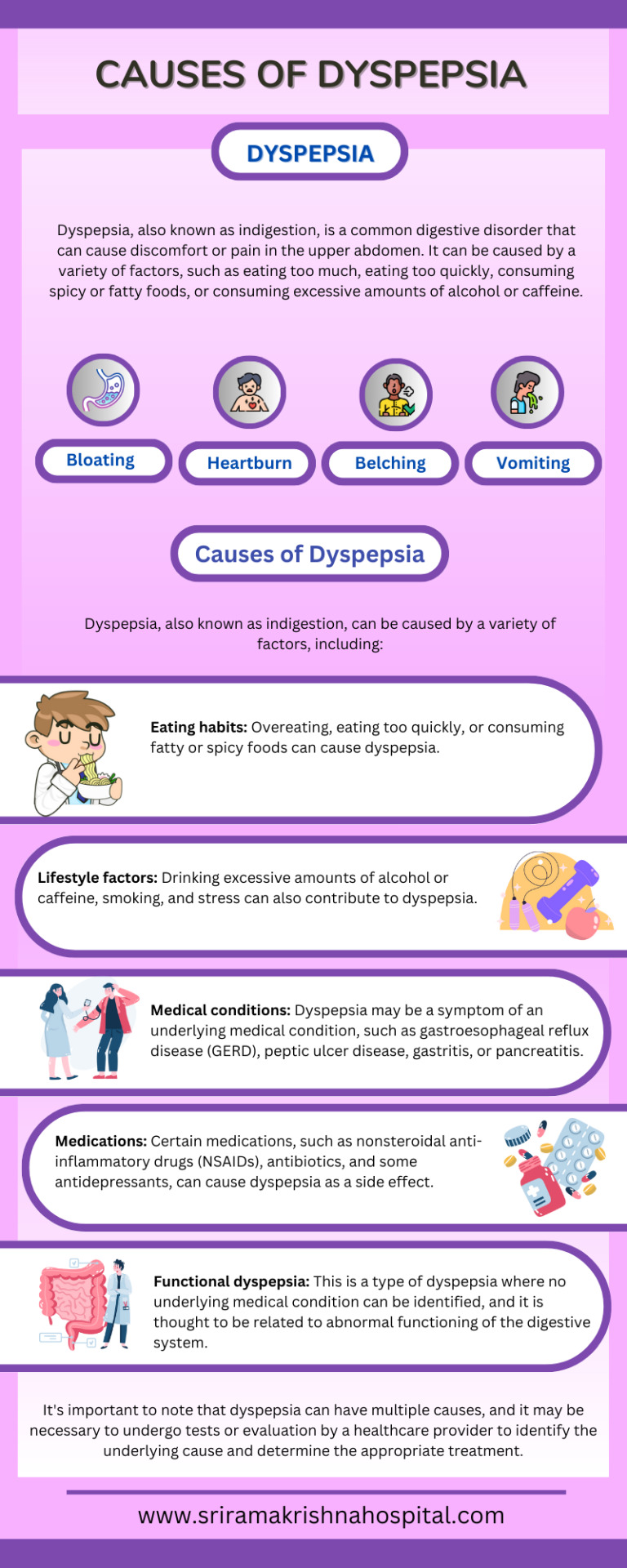
#Dyspepsia Treatment in coimbatore#indigestion treatment in coimbatore#non ulcer dyspepsia treatment in coimbatore
0 notes
Text
Stomach Good Health
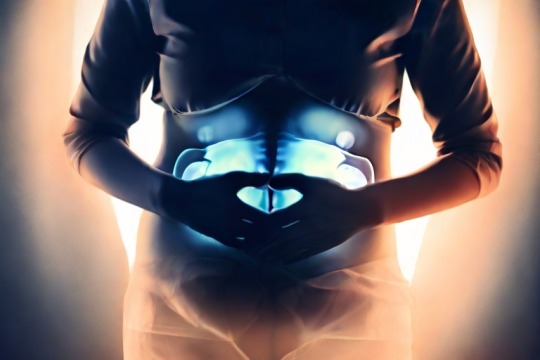
Introduction
Importance of Stomach Health
Overview of Digestive System Functions
Understanding the Stomach
Anatomy of the Stomach
Role of the Stomach in Digestion
Common Stomach Problems
Indigestion
Acid Reflux
Ulcers
Diet and Stomach Health
Impact of Diet on Stomach Health
Foods to Promote Stomach Health
Foods to Avoid
Hydration and Its Effects
Importance of Adequate Hydration
How Hydration Affects Digestion
The Role of Probiotics
Benefits of Probiotics for the Stomach
Sources of Probiotics
Stress and Stomach Health
Connection Between Stress and Digestion
Techniques to Manage Stress for Better Stomach Health
Exercise and Stomach Function
Benefits of Physical Activity for Digestion
Recommended Exercises for Stomach Health
Lifestyle Habits
Healthy Eating Habits
Importance of Regular Meal Times
Medical Interventions
When to See a Doctor
Common Medical Treatments for Stomach Issues
Preventative Measures
Tips for Maintaining Good Stomach Health
Long-term Strategies for Digestive Wellness
To get more info please click here

Stomach Good Health
Introduction
Stomach health is pivotal to overall well-being. The stomach, an essential component of the digestive system, is responsible for breaking down food, absorbing nutrients, and eliminating waste. Proper stomach function impacts energy levels, immune response, and even mental clarity.
Understanding the Stomach
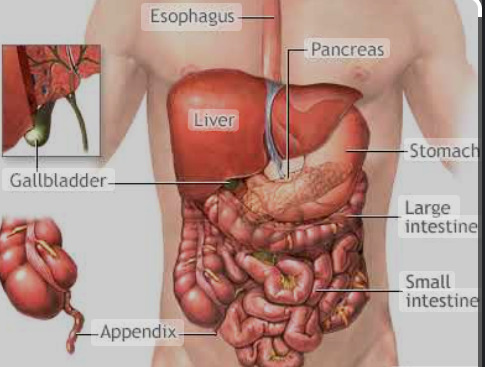
Anatomy of the Stomach
The stomach is a muscular, hollow organ located in the upper abdomen. It is divided into four main sections: the cardia, fundus, body, and pylorus. Each section plays a unique role in digestion. The stomach lining contains glands that produce enzymes and acids essential for breaking down food.
Role of the Stomach in Digestion

The primary function of the stomach is to convert ingested food into chyme, a semi-liquid substance. This process involves mechanical digestion, through muscular contractions, and chemical digestion, through the secretion of gastric juices. The stomach also serves as a temporary storage tank, releasing chyme into the small intestine in controlled amounts.
Common Stomach Problems

Indigestion
Indigestion, or dyspepsia, is a common stomach ailment characterized by discomfort or pain in the upper abdomen. Symptoms include bloating, nausea, and burping. It often results from overeating, eating too quickly, or consuming spicy or fatty foods.
To get more info please click here
Acid Reflux
Acid reflux occurs when stomach acid backs up into the esophagus, causing heartburn and irritation. Chronic acid reflux, known as gastroesophageal reflux disease (GERD), can lead to more severe health issues if left untreated.
Ulcers
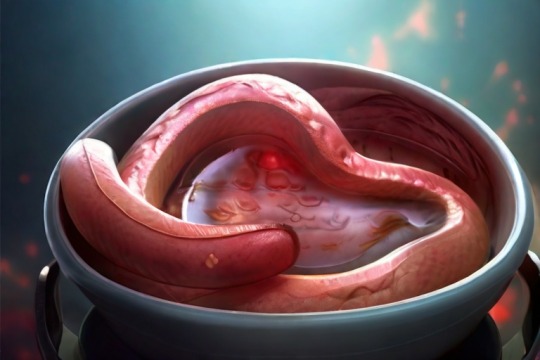
Stomach ulcers are sores that develop on the stomach lining due to erosion from stomach acid. They are often caused by Helicobacter pylori infection or long-term use of nonsteroidal anti-inflammatory drugs (NSAIDs). Symptoms include a burning pain in the stomach, bloating, and indigestion.
Diet and Stomach Health
Impact of Diet on Stomach Health
Diet plays a crucial role in maintaining stomach health. Balanced nutrition supports the stomach’s ability to digest food efficiently and prevents common digestive issues.
Foods to Promote Stomach Health
Foods that promote stomach health include fiber-rich fruits and vegetables, whole grains, lean proteins, and fermented foods. These foods help maintain a healthy balance of gut bacteria and support regular digestion.
Foods to Avoid
To maintain optimal stomach health, it’s advisable to avoid foods high in sugar, fat, and spice, as well as processed foods and carbonated beverages. These can irritate the stomach lining and exacerbate digestive problems.
Hydration and Its Effects
Importance of Adequate Hydration
Adequate hydration is essential for digestive health. Water aids in breaking down food so that nutrients can be absorbed by the body and helps to prevent constipation by keeping the stool soft.
How Hydration Affects Digestion
Proper hydration ensures that the digestive system functions smoothly. Water helps dissolve soluble fiber and fats, making them easier to digest, and assists in the production of digestive juices and enzymes.
The Role of Probiotics
Benefits of Probiotics for the Stomach
Probiotics are beneficial bacteria that promote a healthy gut flora. They help balance the gut microbiome, enhance nutrient absorption, and protect against harmful bacteria.
Sources of Probiotics
Probiotics can be found in fermented foods such as yogurt, kefir, sauerkraut, and kimchi. They are also available in supplement form, which can be useful for individuals who do not consume enough probiotic-rich foods.
Stress and Stomach Health
Connection Between Stress and Digestion
Stress has a significant impact on stomach health. It can alter the digestive process, leading to symptoms such as indigestion, nausea, and changes in bowel habits. Chronic stress can exacerbate conditions like IBS and GERD.
Techniques to Manage Stress for Better Stomach Health
Managing stress through techniques such as meditation, deep breathing exercises, and regular physical activity can improve stomach health. Adequate sleep and maintaining a balanced lifestyle also contribute to reduced stress levels.
Exercise and Stomach Function
Benefits of Physical Activity for Digestion
Regular physical activity enhances digestive health by stimulating the intestinal muscles, helping food move through the digestive system more efficiently. Exercise can also alleviate constipation and reduce symptoms of digestive disorders.
Recommended Exercises for Stomach Health
Exercises beneficial for stomach health include walking, yoga, and moderate aerobic activities. These exercises promote blood flow to the digestive organs and encourage the rhythmic contractions of the intestines.
Lifestyle Habits
Healthy Eating Habits
Adopting healthy eating habits, such as eating slowly, chewing food thoroughly, and avoiding late-night meals, supports digestive health. Mindful eating can prevent overeating and reduce the risk of indigestion.
Importance of Regular Meal Times
Maintaining regular meal times helps regulate the digestive system. Eating at consistent times each day ensures that the stomach produces digestive enzymes and acids in anticipation of food, promoting efficient digestion.
Medical Interventions
When to See a Doctor
It is important to seek medical advice if experiencing persistent stomach pain, unexplained weight loss, severe heartburn, or blood in stools. These symptoms could indicate a serious condition that requires professional intervention.
Common Medical Treatments for Stomach Issues
Medical treatments for stomach issues vary depending on the condition. They may include antacids, proton pump inhibitors, antibiotics for infections, and lifestyle changes. In severe cases, surgical interventions might be necessary.
Preventative Measures
Tips for Maintaining Good Stomach Health
Maintaining good stomach health involves eating a balanced diet, staying hydrated, managing stress, and exercising regularly. Avoiding smoking and excessive alcohol consumption is also beneficial.
Long-term Strategies for Digestive Wellness
Long-term strategies for digestive wellness include incorporating probiotics into the diet, practicing mindful eating, staying active, and scheduling regular check-ups with a healthcare provider to monitor and maintain digestive health.
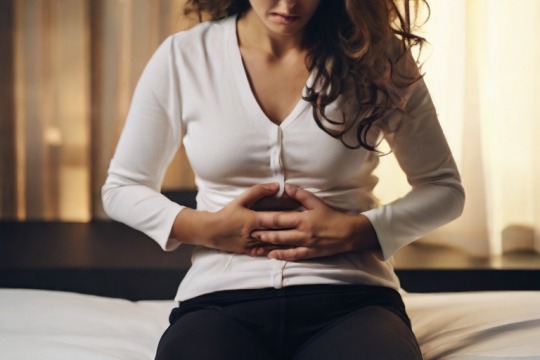
Conclusion
Taking care of your stomach is crucial for overall health and well-being. By understanding the importance of diet, hydration, probiotics, and lifestyle choices, you can ensure that your digestive system functions optimally, preventing discomfort and promoting a healthier life.
To get more info please click here
DISCLAIMER
There is an affiliate link in this article, which may make some profit for me.
1 note
·
View note
Text
Effective Treatments for Stomach Pain: A Comprehensive Guide to Relief
Introduction
Stomach pain, also known as abdominal pain, is a common ailment experienced by people of all ages. This discomfort can range from a mild ache to severe pain and may be associated with a variety of underlying causes. Addressing stomach pain effectively requires an understanding of these causes and the appropriate treatment methods. In this comprehensive guide, we will explore the various causes of stomach pain, discuss when to seek medical attention, and detail the stomach pain treatment options, including both home remedies and medical interventions.
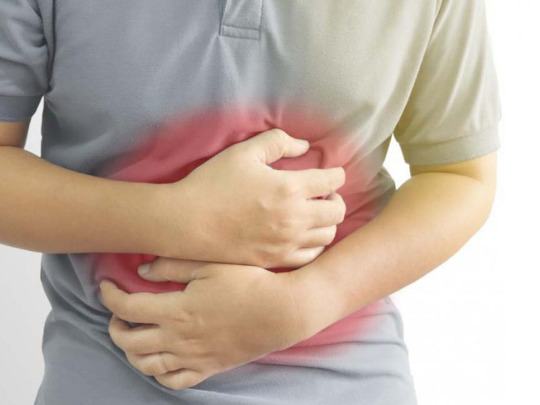
Understanding Stomach Pain
Stomach pain can manifest in different forms and intensities, depending on the underlying cause. It can be acute, developing suddenly and lasting for a short period, or chronic, persisting over a longer duration. The pain may be localized to a specific area or generalized across the abdomen. Common symptoms accompanying stomach pain include nausea, vomiting, bloating, diarrhea, and fever.
Common Causes of Stomach Pain
Indigestion (Dyspepsia): Often caused by overeating, consuming spicy or fatty foods, or stress, indigestion can lead to discomfort and bloating.
Gastroenteritis: Also known as stomach flu, this condition is caused by infections (viral, bacterial, or parasitic) and leads to symptoms like diarrhea, vomiting, and abdominal cramps.
Irritable Bowel Syndrome (IBS): A chronic condition characterized by symptoms like cramping, bloating, gas, diarrhea, and constipation.
Acid Reflux (GERD): When stomach acid flows back into the esophagus, it can cause heartburn and upper abdominal pain.
Gallstones: Hardened deposits in the gallbladder that can cause severe pain in the upper right abdomen, often triggered by eating fatty meals.
Peptic Ulcers: Sores that develop on the lining of the stomach, small intestine, or esophagus, leading to burning pain.
Appendicitis: Inflammation of the appendix, causing severe pain in the lower right abdomen that usually requires surgical intervention.
Constipation: Difficulty in passing stools can lead to bloating and lower abdominal pain.
Menstrual Cramps: Pain during menstruation due to uterine contractions.
Food Intolerances or Allergies: Reactions to certain foods can cause abdominal pain, bloating, and diarrhea.
When to Seek Medical Attention
While many cases of acidity home treatment, certain symptoms may indicate a more serious condition requiring prompt medical attention. Seek medical help if you experience:
Severe or persistent abdominal pain
Pain that spreads to other parts of the body
High fever
Bloody or black, tarry stools
Persistent vomiting
Difficulty breathing
Unexplained weight loss
Swelling or tenderness in the abdomen
Home Remedies for Stomach Pain
For mild to moderate stomach pain, several fatty liver treatment can provide relief:
1. Hydration
Maintaining proper hydration is crucial, especially if your stomach pain is accompanied by vomiting or diarrhea. Drinking clear fluids such as water, herbal teas, and broth can help prevent dehydration.
2. Ginger
Ginger has natural anti-inflammatory and digestive properties. Sipping on ginger tea or chewing a small piece of fresh ginger can help alleviate nausea and stomach pain.
3. Peppermint
Peppermint can relax the muscles of the gastrointestinal tract and reduce bloating and pain. Drinking peppermint tea or sucking on peppermint candies can provide relief.
4. Chamomile Tea
Chamomile has anti-inflammatory and antispasmodic properties, making it effective for soothing digestive issues. A cup of chamomile tea can help calm stomach pain.
5. Heating Pad
Applying a warm heating pad or hot water bottle to your abdomen can help relax the muscles and reduce cramps and pain.
6. Apple Cider Vinegar
Mixing a tablespoon of apple cider vinegar in a glass of warm water and drinking it before meals can aid digestion and reduce stomach pain caused by indigestion.
7. BRAT Diet
The BRAT diet (bananas, rice, applesauce, and toast) is gentle on the stomach and can help fatty liver disease treatments or diarrhea.
8. Probiotics
Probiotics promote a healthy balance of gut bacteria and can be beneficial for digestive health. Consuming yogurt or probiotic supplements can help alleviate stomach pain related to digestive issues.
Lifestyle Modifications for Preventing Stomach Pain
Making certain lifestyle changes can help prevent stomach pain and promote overall digestive health:
1. Healthy Diet
Adopt a balanced diet rich in fruits, vegetables, whole grains, and lean proteins. Avoid overeating and limit the intake of spicy, fatty, and processed foods.
2. Regular Exercise
Regular physical activity can improve digestion and prevent constipation. Aim for at least 30 minutes of moderate exercise most days of the week.
3. Stress Management
Stress can exacerbate digestive issues. Practice stress-reducing techniques such as meditation, deep breathing, yoga, and mindfulness.
4. Adequate Hydration
Drink plenty of water throughout the day to keep your digestive system functioning smoothly.
5. Regular Meal Times
Eating meals at regular intervals can help regulate digestion and prevent overeating.
Medical Treatments for Stomach Pain
If home remedies and lifestyle modifications are not effective, medical treatments may be necessary. The appropriate treatment will depend on the underlying cause of the stomach pain:
1. Medications
Antacids: Over-the-counter antacids can neutralize stomach acid and provide relief from acid reflux and indigestion.
H2 Blockers and Proton Pump Inhibitors (PPIs): These medications reduce the production of stomach acid and are used to treat GERD and peptic ulcers.
Antibiotics: If a bacterial infection such as Helicobacter pylori is causing stomach pain, antibiotics may be prescribed.
Antispasmodics: These medications can help relieve abdominal cramps and pain associated with IBS.
Laxatives: For constipation-related pain, laxatives can help promote bowel movements.
Anti-nausea Medications: These can help manage nausea and vomiting associated with stomach pain.
2. Surgical Interventions
In some cases, surgery may be required to treat the underlying cause of stomach pain:
Appendectomy: Surgical removal of the appendix in cases of appendicitis.
Cholecystectomy: Removal of the gallbladder if gallstones are causing severe pain and complications.
Hernia Repair: Surgery to repair hernias that cause abdominal pain.
Bowel Resection: Removal of a damaged or diseased portion of the intestine in cases of severe bowel obstruction or inflammatory bowel disease.
3. Endoscopic Procedures
Endoscopy involves using a flexible tube with a camera to examine the digestive tract. This can help diagnose conditions such as ulcers, gastritis, and esophageal problems. It can also be used for therapeutic interventions like polyp removal or treatment of bleeding ulcers.
4. Lifestyle Counseling and Support
For chronic conditions such as IBS or functional dyspepsia, counseling and support from a dietitian or therapist can help manage symptoms and improve quality of life.
Conclusion
Stomach pain is a common and often distressing symptom that can result from various causes. Understanding the underlying cause of the pain is crucial for determining the most effective treatment approach. While many cases of stomach pain can be managed with home remedies and lifestyle modifications, it is essential to seek medical attention if the pain is severe, persistent, or accompanied by alarming symptoms.
Incorporating healthy habits such as a balanced diet, regular exercise, stress management, and adequate hydration can help prevent stomach pain and promote overall digestive health. When medical intervention is necessary, a range of treatments, including medications, surgical procedures, and endoscopic techniques, can provide relief and address the underlying cause of the pain.
By taking a proactive approach to managing stomach pain and seeking appropriate medical care when needed, individuals can improve their digestive health, alleviate discomfort, and enhance their overall well-being.
0 notes
Text
Introduction:
Hyperacidity, a common gastrointestinal ailment, manifests as an imbalance in the stomach's pH level, leading to discomfort and various associated symptoms. Factors such as alcoholism, smoking, stress, spicy foods, irregular eating habits, and prolonged NSAID use contribute to this condition. Nixocid syrup emerges as a potential solution, effectively relieving hyperacidity by restoring the stomach's pH balance.
Understanding Hyperacidity:
Hyperacidity, also known as acid reflux or acid dyspepsia, occurs when there is an excess of gastric acid in the stomach. This imbalance disrupts the normal pH level, leading to symptoms like heartburn, indigestion, bloating, and nausea. Various lifestyle and dietary factors, including alcohol consumption, smoking, stress, spicy foods, irregular eating patterns, and prolonged use of NSAIDs, can trigger hyperacidity.
Role of Nixocid Syrup:
Nixocid syrup offers relief from hyperacidity and its associated symptoms by normalizing the pH level of the stomach. The syrup contains ingredients that work synergistically to neutralize excess acid and create a balanced environment in the stomach. By addressing the root cause of hyperacidity, Nixocid effectively alleviates discomfort and promotes digestive health.
Mechanism of Action:
Nixocid syrup exerts its effects through a multifaceted mechanism. The key ingredients in Nixocid act as antacids, buffering the excess acid in the stomach and promoting its neutralization. Additionally, certain components of the syrup stimulate the production of mucosal protective factors, enhancing the stomach lining's resistance to acid damage. This dual action helps restore the stomach's pH balance and provides long-lasting relief from hyperacidity.
Alleviating Factors:
Individuals suffering from hyperacidity can find relief by addressing contributing factors such as alcoholism, smoking, stress, and irregular eating habits. Avoiding spicy foods and moderating NSAID use can also help prevent exacerbation of symptoms. Incorporating lifestyle modifications alongside Nixocid syrup usage can lead to improved digestive health and overall well-being.
Clinical Efficacy:
Clinical studies have demonstrated the efficacy of Nixocid syrup in relieving hyperacidity and associated symptoms. Patients reported significant reductions in heartburn, indigestion, and bloating following treatment with Nixocid. Moreover, the syrup exhibited a favorable safety profile, with minimal adverse effects reported. These findings underscore the therapeutic potential of Nixocid as a reliable remedy for hyperacidity.
Patient Education:
Educating patients about hyperacidity and its contributing factors is essential for effective management. Healthcare providers should counsel individuals on lifestyle modifications, dietary habits, and medication usage to prevent recurrent episodes of hyperacidity. Patients should be advised to adhere to recommended dosages and follow-up appointments to monitor treatment efficacy and address any concerns.
Conclusion:
Hyperacidity is a prevalent gastrointestinal condition characterized by an imbalance in the stomach's pH level, leading to discomfort and various symptoms. Nixocid syrup offers an effective solution by normalizing stomach pH and alleviating hyperacidity symptoms. By addressing lifestyle factors and incorporating Nixocid into treatment regimens, individuals can experience significant relief and improved digestive health. Patient education plays a crucial role in promoting awareness and empowering individuals to manage hyperacidity effectively. With its proven efficacy and safety profile, Nixocid syrup stands as a trusted option for those seeking relief from hyperacidity and associated discomfort.
0 notes
Photo
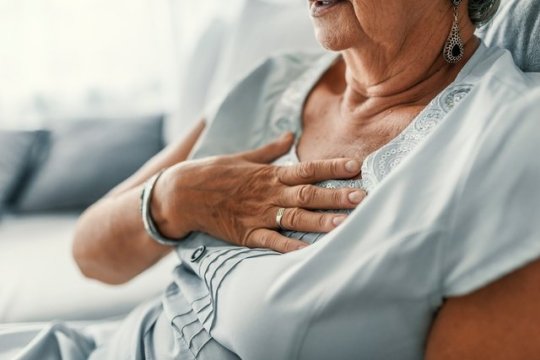
Dyspepsia: what it is, symptoms, causes and treatment - https://storelatina.com/?p=97089
0 notes